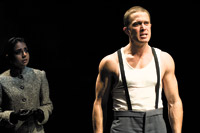Stage acting is where TV stars go to demonstrate that they’ve got chops. And when stage actors want to assay the test of great acting, they go to Shakespeare. All Shakespeare roles, even the minor ones, are difficult—the language is arcane and lacking in the traditional subtext of modern drama, meaning that the actor’s mind has to be nimble or the words come out as a sort of lava flow of generalized verbosity. But to take on a major role in the tragedies takes some very particular qualities indeed.
So what’s it take for actors to do Shakespeare right? Last week I was in Ashland, Oregon, where they specialize in the sort of superb Shakespearean acting you rarely see on a Seattle stage. After I got back home, I called Stephanie Shine, the artistic director of Seattle Shakespeare Company and an Oregon Shakespeare Festival vet herself, to compare lists of what’s necessary for an actor to pull off a major role in one of the plays. “I look for beautiful voices, because we’re going to be listening to them a long time,” she says, “and an actor who can move with the verse, make it come alive.” It’s an important point: There’s a lot of “stand and declaim” style of acting with our local actors, which gives one the impression that the characters don’t have dialogue, just big speeches.
In many of the plays this sort of acting is regrettable and a little dull, but in a lesser-known play like Coriolanus, it can be deadly. In the current OSF production, Danforth Comins is superb at particularizing the language of a character who too often comes across as simply a big jerk. It’s not through showing us his “tender side”: Coriolanus doesn’t really have one. But his ceaseless drive towards action keeps him charging forward in a role that’s a major endurance test. Good thing he’s up for it: Comins moves like an athlete and is, frankly, ripped. (One of the pleasures of Ashland is the number of buff bodies up on that stage—several of the actresses looked like they could floor me with one punch.) Clad in camo and sporting an assault rifle (it’s a contemporary setting), he’s as aggressive with language as he is with his body, rallying his men like an honest-to-God action hero. A fight with his arch-nemesis Aufidius starts with knives and ends up hand-to-hand, and it’s as thrilling and well-choreographed as anything Daniel Craig’s James Bond gets up to. But when Coriolanus has turned against Rome and leads an army to its gates, we discover his fatal weakness: He’s a mama’s boy. Mother tells him to turn back, and with a primal scream at a foe that he can’t strike or kill, Comins crumples and implodes.
But it was the double-act of Dan Donohue as Iago and Peter Macon as Othello that truly blew me away. I’ve seen more than a half-dozen productions of Othello, and if you’d asked me what the problem with any of them was, I would have given a half-dozen different answers; it’s a notoriously tough play. But I finally saw what one has to get exactly right about it, a quality that rounded out Shine’s list. “When you’re a Shakespearean lead, you’re carrying the play, but the only way you can do that is if you’re generous.” Donohue and Macon were the first actors I’d ever seen in these parts who carefully, even scrupulously, divided the play up between them. The first half of the play is indisputably Iago’s. His brilliant manipulation of everyone around him, his soliloquies to the audience, his passion, his malcontent—he’s such an enticing villain that he wins us over too. Donohoe (who’s been featured repeatedly at the Rep) is an actor of such verbal fluency that you find yourself wondering if he’s suddenly tossed the script and is just speaking his thoughts. His greatest gift to the role is his wit; he’s often hilarious. (Every time he was called “honest Iago” by another character, laughter would ripple through the audience.)
He has us in the first half, but then, surprisingly, he steps back in the second and hands the play to Macon. (At the play’s beginning, Othello is so heroic, temperate, and virtuous that he’s not particularly interesting.) As we watch the poison of Iago’s counsel work within him, Macon seems to swell and inflate with violence, until he’s literally in a fit of jealousy, rolling on the floor unable to speak. For the first time I’ve seen this show, Desdemona’s death was not just tragic, it was horrific, almost unwatchable. Then, as the full import of his mistake becomes clear, Macon again becomes the gentle, noble soul from the play’s beginning, and his suicide is devastating.
Voice, physicality, command of verse, maturity, generosity—it’s a tall order for any actor. Shakespeare’s tragic roles demand all of this and more. It’s courageous for any actor to attempt these characters. And it’s sublime when they succeed.








